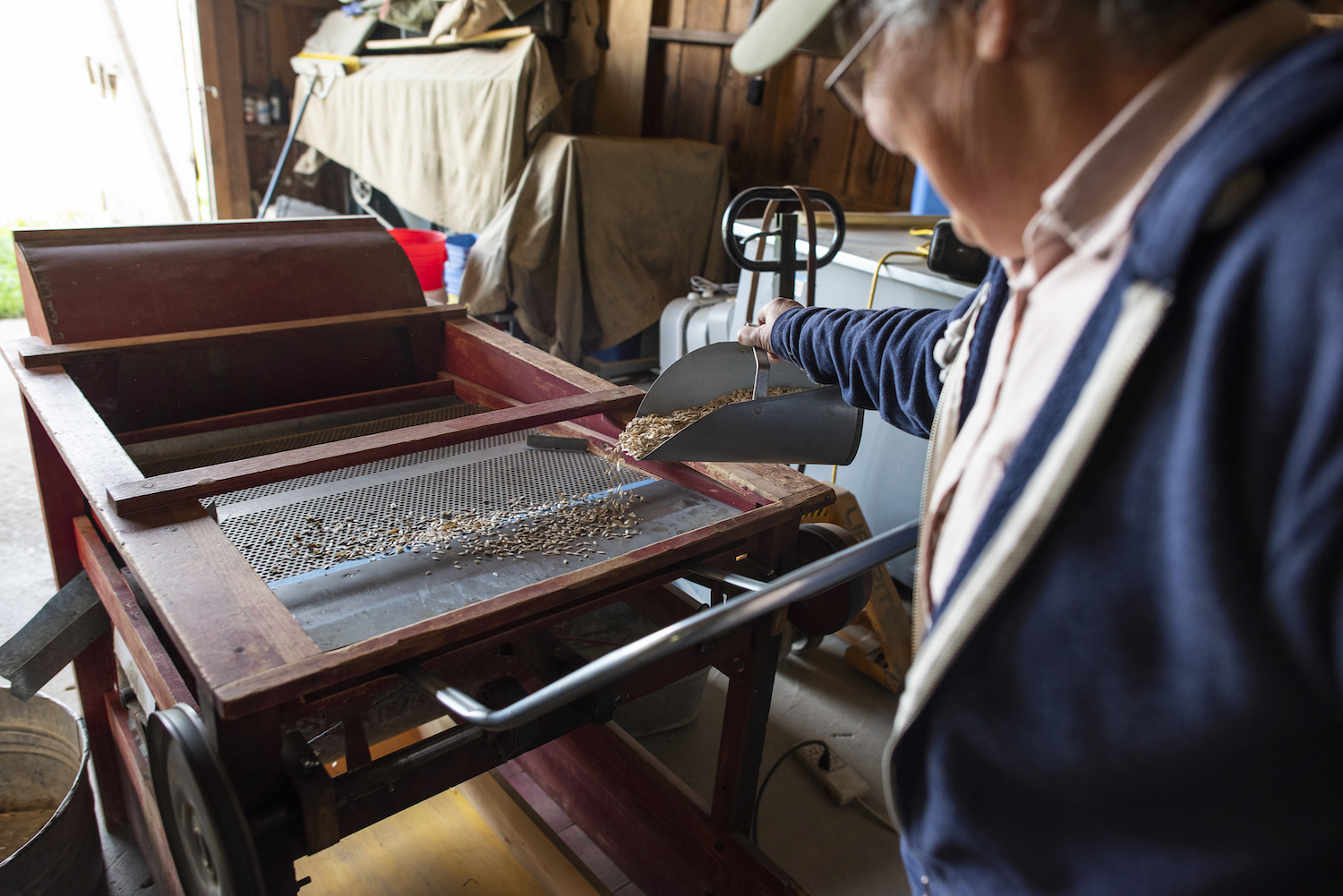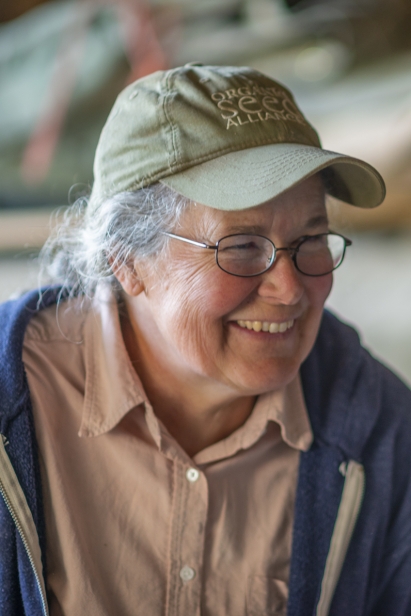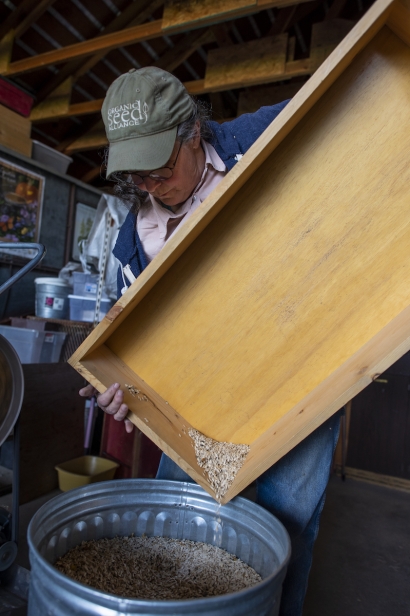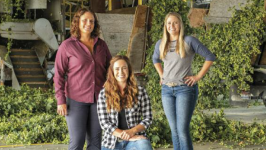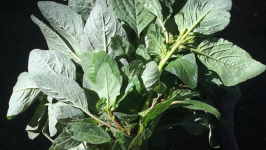Seeds of Change: Beth Rasgorshek takes the Organic Approach at Canyon Bounty Farm
Beth Rasgorshek has worn many hats: journalist, pioneering CSA farmer, flour producer and now seed farmer.
Today, Rasgorshek grows certified organic vegetable seeds on seven tillable acres at Canyon Bounty Farm in Mampa. “I’ve been doing vegetable seeds for almost 20 years,” she says. But Rasgorshek’s story begins long before that.
Growing up in a family of longtime seed farmers, just a quarter mile from where she now farms, would certainly influence Rasgorshek’s future career choice. “I was fortunate to be raised by a farm family and got to see the realities of what that was about,” she says. “I knew the big picture.”
Rasgorshek spent time working as a journalist before deciding to pursue CSA farming in Portland, Oregon. But after establishing one of the first community-supported agriculture (CSA) harvest subscription farms in Portland in 1993, she wanted to get out of the city and return to her roots.
“I was ready for a change and decided I would move back home,” she says. “I wasn’t really sure what farming in the Treasure Valley looked like at that point, but I was paying attention to the National Organic Program around 1999 and realized that they were looking at organic seeds. It occurred to me that if I didn’t want to do fresh produce, maybe seeds would be a possibility, given that my family were seed farmers.”
At Canyon Bounty Farm, Rasgorshek raises both small-seeded and big-seeded crops like green beans, dry beans, edamame, various flower seeds, watermelon, muskmelon, peppers, wheat, leeks and onion. All the seeds she produces are contracted with what she calls the “usual suspects” of organic seed companies.
“Beth has done more than anyone in the area to raise awareness about the importance of local, organic seeds for large-scale production,” says Janie Burns of Meadowlark Farm in Nampa.
Local seeds weren’t always her sole focus, though. Up until a few years ago, Rasgorshek also produced wheat flour before deciding to focus on seeds. “Producing the wheat and adding value by grinding it into flour was really lots of fun, but I made two very crucial mistakes,” she says. “One was that I was growing conventional types of wheat that did not do well in an organic system. The second was that I bought the wrong flour mill.”
Rasgorshek says that although having the income from the flour was a great way to spread revenue throughout the entire growing season (a problem many farmers struggle with), and although it would be easier to start producing flour again today knowing what she knows, she’s happy with her decision to stick to seed production.
“I’m just more of a farmer than a baker,” she says. “sometimes you do just have to narrow in on what’s important to you.”
And Rasgorshek hasn’t looked back. Today, Canyon Bounty Farm boasts more combines and tractors than when she first started farming, reflecting the growth of her operation. Being highly mechanized allows Rasgorshek to only need a few employees, along with the support of her family.
Because fluctuation is innate to the world of farming, Rasgorshek relishes the opportunity to keep fine-tuning and learning from season to season. “seeds fluctuate from year to year due to how the economy is doing in general,” she says. “one year you may be turning away seed contracts, the next you’re initiating phone calls. There’s this ebb and flow. It’s part of being self-employed.”
Every farmer knows of this ebb and flow, and Rasgorshek is grateful not only for the support of her family, but also for the support of the Treasure Valley farming community. “I’m certainly grateful to farmers like Janie Burns, who really welcomed me when I moved back here,” she says.
Even though female farmers have been getting more attention as of late, Rasgorshek says she hasn’t noticed any drastic change in how she’s treated or recognized because she has always felt on equal footing with her male farmer counterparts and has always looked up to both female and male farming mentors. “In the farm culture I grew up in, the women were just as important as the men,” she says. “Because I’ve always been a sustainable farmer, there have always been women around.”
When Rasgorshek started her farm in Portland with a male business partner, she says their community of support was equal in gender. “We leaned on each other because we needed the support of being new farmers in a new farm model,” she says. “It had nothing to do with our sex. It had everything to do with this new farm model. We really supported each other to make it through one season, then the next, then the next.”
That support is crucial in the world of farming, which is much bigger than just going out to plant a seed and get a harvest. Rasgorshek is well aware of the financial risks of farming, and works hard to ensure that being a good business person is also a part of her farm plan.
“You have to make sure that the income is there, that the expenses are covered, and that you can follow through on the commitments you’ve made,” she says. “For me that’s my seed contracts. I do everything within my ability to make sure my seeds are viable enough to ship off to seed companies.”
That sense of accomplishment when the final product is shipped off is one of the things that keeps Rasgorshek going—that, and her family ties, and knowing she’s surrounded by people who can relate to the realities of being a seed farmer.
“This is a farm I grew up playing on as a kid,” she says. “My family have been seed farmers for a long, long time. I have truly benefited from their expertise and skill set and have been further blessed by all of their support.”


